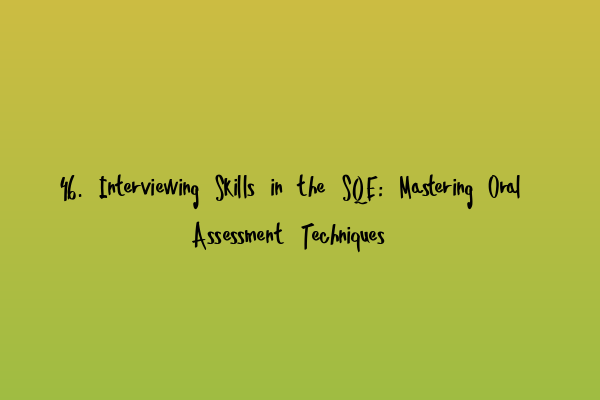46. Interviewing Skills in the SQE: Mastering Oral Assessment Techniques
In the SQE (Solicitors Qualifying Exam), one of the key components is the oral assessment, which tests your ability to interview clients effectively. Mastering interviewing skills is crucial for aspiring solicitors, as it is an essential part of the legal profession. In this article, we will discuss the importance of interviewing skills in the SQE, provide tips to excel in this assessment, and guide you towards resources that can help you prepare effectively.
Before we dive into the details, it’s important to understand why interviewing skills are so critical for solicitors. As a solicitor, you will frequently interact with clients who seek legal advice or representation. Your ability to extract essential information, build rapport, and establish trust during an interview can determine the success of your legal practice.
During the SQE oral assessment, you will be presented with real-life scenarios where you need to conduct an interview. The assessors will evaluate your ability to ask pertinent questions, actively listen, and respond appropriately to the client’s needs and concerns. Your performance in this assessment will not only demonstrate your legal knowledge but also reflect your interpersonal skills, attention to detail, and ethical considerations.
To excel in the SQE oral assessment and master interviewing skills, here are some useful tips:
1. Prepare in advance: Familiarize yourself with the legal principles, rules, and procedures relevant to the scenario you may encounter during the assessment. Conduct mock interviews to practice your questioning techniques and hone your active listening skills.
2. Establish a structure: Formulate a structured approach to interviews, ensuring you cover all necessary areas while allowing flexibility to adapt based on the client’s responses. This will ensure you gather all relevant information and explore different avenues to build a strong case.
3. Active listening: Pay close attention to the client’s responses and non-verbal cues. Demonstrating active listening skills not only helps you understand the client’s situation better but also shows empathy and instills confidence in your ability to handle their case.
4. Effective questioning: Ask open-ended questions to encourage clients to provide detailed responses. Use closed-ended questions when seeking specific information. Strike a balance between directive and nondirective approaches, guiding the conversation while allowing the client to express their concerns.
5. Empathy and rapport building: Show empathy towards the client’s situation, making them feel understood and comfortable. Building rapport helps establish trust, making the client more willing to share essential details and collaborate throughout the legal process.
6. Manage time effectively: Allocate sufficient time to each part of the interview, ensuring all essential areas are covered. Be mindful of using the available time efficiently, avoiding excessive digressions or distractions that may hinder a thorough assessment.
7. Ethics and professionalism: Throughout the interview, maintain a high level of professionalism and ethical conduct. Respect client confidentiality, avoid any conflicts of interest, and prioritize the client’s best interests.
To further enhance your oral assessment skills, consider utilizing the following resources:
– SQE 1 Practice Exam Questions: These quizzes will help you test your legal knowledge and understand how it applies to real-life scenarios, preparing you for the oral assessment.
– SQE 1 Practice Mocks FLK1 FLK2: These practice mocks will simulate the actual oral assessment, allowing you to familiarize yourself with the format and gain valuable experience.
– SQE 2 Preparation Courses: These courses focus on developing practical skills required for solicitors, including interviewing techniques, negotiation skills, and oral advocacy.
– SQE 1 Preparation Courses: These courses cover the foundational legal knowledge needed for the SQE, providing you with a solid understanding of legal principles.
– SRA SQE Exam Dates: Familiarize yourself with the exam dates to plan and structure your preparation effectively.
In conclusion, mastering interviewing skills is essential for success in the SQE oral assessment and in your future legal career as a solicitor. By preparing in advance, establishing a structure, actively listening, asking effective questions, building rapport, managing time effectively, and maintaining ethical conduct, you can excel in this assessment. Utilize the available resources to enhance your oral assessment skills and confidently tackle the SQE exams.
Remember, the SQE is not just about legal knowledge; it’s also about practical skills, and interviewing is a key component of this. So, start practicing and perfect your interviewing skills to become a well-rounded solicitor ready to face the challenges of the legal profession.
